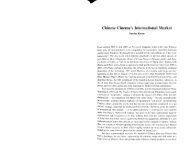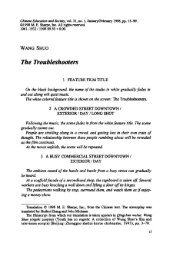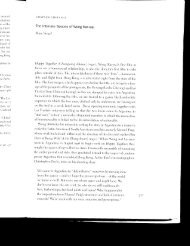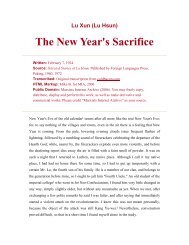Popular Cinema and Political Thought in Post-Mao China
Popular Cinema and Political Thought in Post-Mao China
Popular Cinema and Political Thought in Post-Mao China
You also want an ePaper? Increase the reach of your titles
YUMPU automatically turns print PDFs into web optimized ePapers that Google loves.
40 Paul G. Pickowiczexploratory chapter) would have to account, among many other th<strong>in</strong>gs, forthe popularity of other film genres among these people. Similarly, a comprehensiveanalysis of their political thought would require an evaluation ofmany sources, not just the film materials discussed here.The films of the late 1970s, the immediate post-Cultural Revolutionperiod, arc not very useful for our purposes because the Ch<strong>in</strong>ese film <strong>in</strong>dustryrecovered very slowly from the political <strong>and</strong> artistic ravages of the ten-yearCultural Revolution. Large numbers of films were produced after <strong>Mao</strong>'sdeath (129 features were made from 1977 to 1979, compared to only 109features turned out <strong>in</strong> the Cultural Revolution decade) <strong>and</strong> box-office receiptssoared to unprecedented heights, but the new films broke very little freshpolitical ground. One critic observed that the film audience was starved:"They flocked to the c<strong>in</strong>ema to watch any film that was show<strong>in</strong>g." 4 Whilesignificant numbers of literary <strong>in</strong>tellectuals <strong>and</strong> reform activists were participat<strong>in</strong>g<strong>in</strong> the political protest movements of 1978 <strong>and</strong> 1979, filmmakers,accord<strong>in</strong>g to D<strong>in</strong>g Qiao, deputy director of the Film Bureau <strong>in</strong> the early1980s, were still mak<strong>in</strong>g movies that "bore traces of the stereotypes" associatedwith filmmak<strong>in</strong>g <strong>in</strong> the Cultural Revolution. 5This is not to suggest that the film <strong>in</strong>dustry was totally unaffected bythe political protests of the late 1970s. But the impact became apparent onlyafter the crackdown on Democracy Wall <strong>in</strong> late 1979 as films echo<strong>in</strong>g <strong>and</strong>populariz<strong>in</strong>g the concerns of the protesters f<strong>in</strong>ally began to surface. Manyof these motion pictures were based on works of fiction published beforethe demise of Democracy Wall. The new political thrust of Ch<strong>in</strong>ese c<strong>in</strong>emabecame evident around 1980. True, filmmakers constituted a privileged elite,the film <strong>in</strong>dustry was still monopolized by the state <strong>and</strong> monitored by partycensors, <strong>and</strong> the great majority of new works still contributed little to thepopular political discourse or to the development of film art <strong>in</strong> Ch<strong>in</strong>a, butbeg<strong>in</strong>n<strong>in</strong>g <strong>in</strong> 1980 a small but potent c<strong>in</strong>ema of social criticism, l<strong>in</strong>kedboth <strong>in</strong> terms of form <strong>and</strong> content to the rich traditions of the 1930s <strong>and</strong>1940s, began to emerge as the most popular genre of new films, especiallyamong educated urban youth. Unprecedented numbers of works that clearlyexpressed unofficial political views slipped through state censorship organs.In my estimation the most <strong>in</strong>terest<strong>in</strong>g group of popular political filmswas completed <strong>in</strong> the period from 1980 to early 1983, that is, the yearsbetween the fall of Democracy Wall <strong>and</strong> the launch<strong>in</strong>g of the campaignaga<strong>in</strong>st spiritual pollution <strong>in</strong> 1983. Three of the most representative worksthat circulated <strong>in</strong> this unusual period arc The legend of Tianyun Mounta<strong>in</strong>(1980), directed by Xie J<strong>in</strong>; A corner forgotten by love (1981), directed byLi Yal<strong>in</strong> <strong>and</strong> Zhang Ji; <strong>and</strong> At middle age (1982), directed by Wang Qim<strong>in</strong><strong>and</strong> Sun Yu. 6 These films came closer than anyth<strong>in</strong>g else produced after1949 to an openly critical popular c<strong>in</strong>ema. They were widely acclaimed bythe film establishment, highly critical of the Communist party, extraord<strong>in</strong>arilypopular among the film audience at a time when the film <strong>in</strong>dustry wasbeg<strong>in</strong>n<strong>in</strong>g to get stiff competition from the television world, <strong>and</strong> subjectedto tough criticism <strong>in</strong> the official press.<strong>Popular</strong> <strong>C<strong>in</strong>ema</strong> ;The legend opublished <strong>in</strong> 1 Swho was attackvictimized for Istudies <strong>in</strong> contr1957, but, <strong>in</strong> 01off the marriagerightist. The otl<strong>in</strong> 1957, fell <strong>in</strong>sacrificed her caordeal. More th






